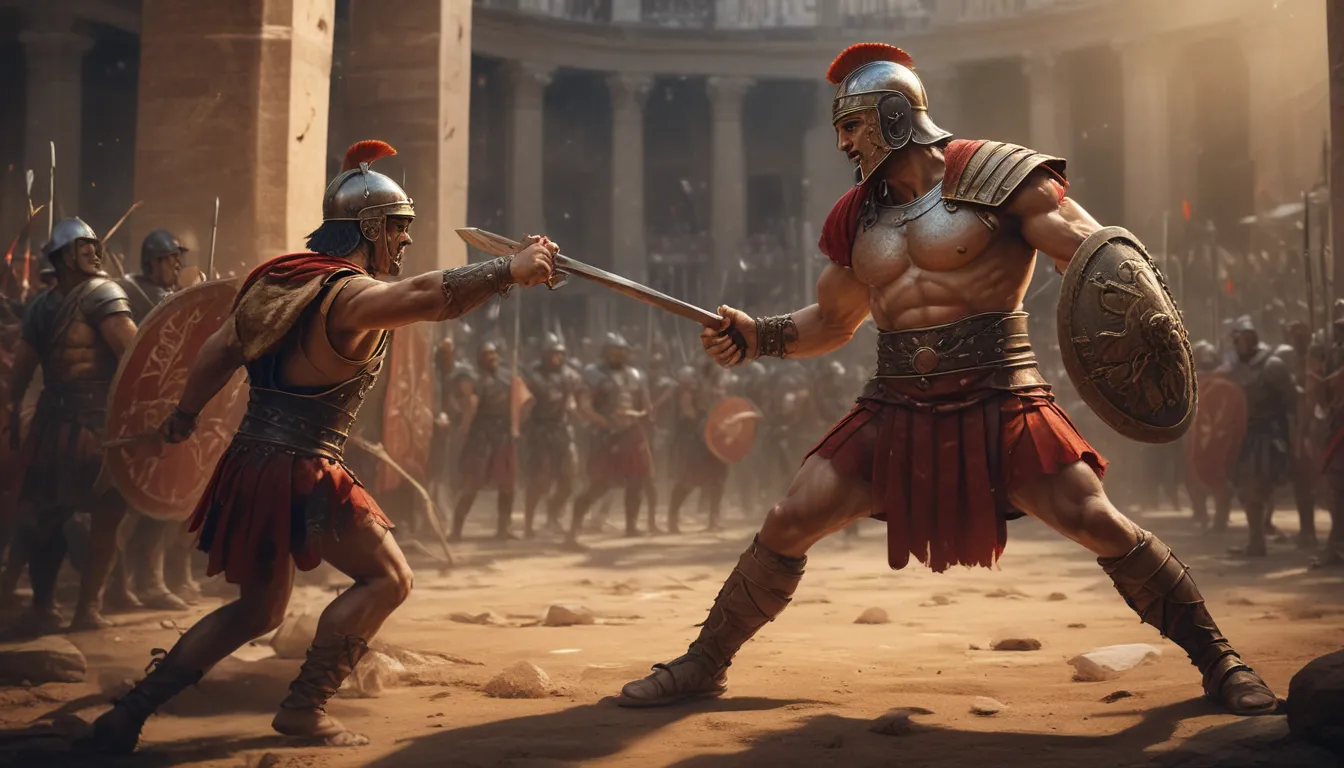The images in our articles may not match the content exactly. They are used to grab your attention, not to show the exact details in the text. The images complement the text but do not replace it.
Ancient Rome, a civilization renowned for its grandeur and complexity, was home to a unique breed of warriors known as gladiators. These formidable fighters, who graced the arenas of the Roman Empire with their skill and valor, continue to captivate us with their tales of bravery and sacrifice. In this comprehensive guide, we will delve into the fascinating world of Roman gladiators, uncovering 15 intriguing facts about their lives, the games they participated in, and the legacy they left behind.
Unveiling the Enigmatic Roman Gladiators
Let’s start by understanding who exactly these Roman gladiators were. These warriors were individuals who engaged in combat against each other, wild animals, and criminals in arenas across the Roman Empire, all for the entertainment of the masses. While many gladiators were slaves, prisoners of war, or condemned criminals, some free men also willingly entered the arena, driven by the promise of fame, fortune, or glory.
Delving into the Origins of Gladiatorial Games
The history of gladiatorial games traces back to ancient Rome’s funeral rites during the Punic Wars. Initially serving as a blood sacrifice to honor the deceased, these games evolved over time into public spectacles sponsored by politicians and emperors seeking popularity and favor. The gladiatorial arena became a symbol of power and prestige, captivating audiences with its displays of skill and valor.
Exploring the Diverse Types of Gladiators
The world of Roman gladiators was as diverse as it was brutal, with various types of fighters each wielding unique weapons and armor. From the Thracians wielding curved swords and shields to the Retiarii armed with tridents and nets, each gladiator brought a distinct set of skills and tactics to the arena. The gladiatorial games were a spectacle of diversity and combat prowess, showcasing the range of talent and expertise among the fighters.
Witnessing the Training and Lives of Gladiators
Life as a gladiator was not for the faint-hearted, as these warriors underwent rigorous training at specialized schools known as ludi. Here, they honed their fighting skills, learned to wield weapons, and mastered the art of entertaining the crowds. Despite the grueling nature of their existence, successful gladiators could rise to fame, amass wealth, and even earn their freedom through victory in the arena. However, the life expectancy of a gladiator was notoriously short, with many meeting their end in the brutal arena battles.
Understanding the Role of Gladiatorial Games in Roman Society
Gladiatorial games played a multifaceted role in ancient Roman society, serving as a source of entertainment, a display of military might, and a means of social control. Emperors and politicians often used these games as a political tool to win favor with the public, staging ever more elaborate and violent spectacles to outshine their rivals. The gladiatorial arena became a symbol of power and prestige, shaping public opinion and reinforcing the authority of the ruling class.
Examining Famous Gladiators and Their Enduring Legacy
Among the ranks of Roman gladiators, certain individuals have left an indelible mark on history. Spartacus, the famed leader of a slave revolt against the Roman Republic, symbolizes the fight for freedom and justice in the face of oppression. Commodus, a Roman Emperor known for his participation in gladiatorial games, stands as a controversial figure whose victories may have been more spectacle than reality. These iconic figures remind us of the complexity and diversity of the gladiatorial world, where legends were born and fates were sealed in the arena.
Tracing the Decline of Gladiatorial Games
As the Roman Empire entered its twilight years, gladiatorial games began to wane in popularity. The rise of Christianity, with its opposition to bloodshed and violence, and the escalating costs of procuring gladiators and wild animals contributed to the decline of these brutal spectacles. The last known gladiatorial games took place in 404 AD, marking the end of an era that had defined Roman entertainment for centuries. Emperor Honorius’s subsequent ban on gladiatorial games signaled a symbolic shift in Roman society, away from the blood-soaked arenas of the past.
Gladiators in Modern Culture: A Lasting Legacy
Despite the passage of centuries, the legacy of Roman gladiators endures in modern culture. From movies and books to video games and reenactments, the gladiatorial world continues to fascinate and inspire audiences around the globe. Through educational programs and historical documentaries, we gain a deeper understanding of the lives, struggles, and triumphs of these ancient warriors, ensuring that their stories are not forgotten. The spirit of the gladiator lives on in our collective imagination, reminding us of the enduring power of courage, resilience, and perseverance in the face of adversity.
Reflecting on the Enigmatic World of Roman Gladiators
In conclusion, the world of Roman gladiators stands as a testament to the complexities of ancient Roman society and the enduring legacy of these iconic warriors. Their lives, filled with both triumph and tragedy, offer us a glimpse into a bygone era where honor, glory, and spectacle intersected in the gladiatorial arena. As we look back on their stories and struggles, let us remember the resilience and courage of these individuals who faced death with bravery and skill. The legacy of the Roman gladiators lives on, a testament to the indomitable spirit of humanity in the face of adversity.
Embracing the Authenticity of Gladiatorial History
At the core of our commitment to delivering engaging and trustworthy content lies a dedication to authenticity and accuracy. Each fact shared in this exploration of Roman gladiators is rooted in historical research and scholarly analysis, ensuring that our readers receive a comprehensive and insightful perspective on this ancient world. Our editors work diligently to uphold the highest standards of quality and reliability, making sure that the information we present is not only fascinating but also credible. As we continue to delve into the rich tapestry of history, we invite you to join us on a journey of discovery and enlightenment, guided by the enduring spirit of the Roman gladiators.
Through this in-depth exploration of Roman gladiators, we have uncovered a wealth of fascinating facts and insights that shed light on their lives, battles, and legacy. From their humble origins to their legendary exploits, these warriors continue to captivate us with their tales of courage and sacrifice. As we celebrate the enduring legacy of the Roman gladiators, let us honor their memory and legacy, preserving their stories for future generations to enjoy and learn from. Join us on this journey through time as we delve into the captivating world of Roman gladiators and the indelible mark they have left on history.






